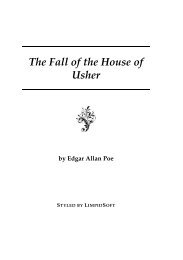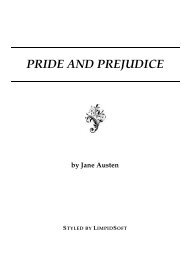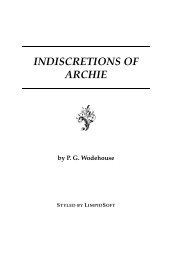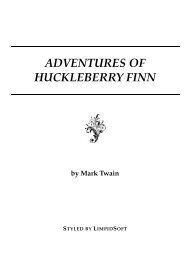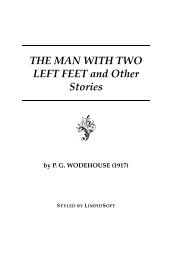- Page 1 and 2:
Anna Karenina by Leo Tolstoy Styled
- Page 3 and 4:
CONTENTS CONTENTS Chapter 1 . . . .
- Page 5 and 6:
The present document was derived fr
- Page 7 and 8:
PART ONE CHAPTER 1 putting it into
- Page 9 and 10:
PART ONE CHAPTER 2 they understood
- Page 11 and 12:
PART ONE CHAPTER 3 Chapter 3 WHEN h
- Page 13 and 14:
PART ONE CHAPTER 3 that he was pret
- Page 15 and 16:
PART ONE CHAPTER 4 his paper and dr
- Page 17 and 18:
PART ONE CHAPTER 4 “Ah, let me al
- Page 19 and 20:
PART ONE CHAPTER 5 point-his comple
- Page 21 and 22:
PART ONE CHAPTER 5 perfectly new, u
- Page 23 and 24:
PART ONE CHAPTER 5 “I don’t und
- Page 25 and 26:
PART ONE CHAPTER 5 even be conceive
- Page 27 and 28:
PART ONE CHAPTER 7 “I maintain th
- Page 29 and 30:
PART ONE CHAPTER 8 “What did you
- Page 31 and 32:
PART ONE CHAPTER 9 He felt as thoug
- Page 33 and 34:
PART ONE CHAPTER 9 back again witho
- Page 35 and 36:
PART ONE CHAPTER 10 Chapter 10 WHEN
- Page 37 and 38:
PART ONE CHAPTER 10 waiters-all of
- Page 39 and 40:
PART ONE CHAPTER 10 “No, stop a m
- Page 41 and 42:
PART ONE CHAPTER 11 some Petersburg
- Page 43 and 44:
PART ONE CHAPTER 12 Chapter 12 THE
- Page 45 and 46:
PART ONE CHAPTER 12 undertaking wit
- Page 47 and 48:
PART ONE CHAPTER 13 “Oh, no,” s
- Page 49 and 50:
PART ONE CHAPTER 14 “Shall you be
- Page 51 and 52:
PART ONE CHAPTER 14 “Oh, then you
- Page 53 and 54:
PART ONE CHAPTER 15 Chapter 15 AT t
- Page 55 and 56:
PART ONE CHAPTER 16 Chapter 16 VRON
- Page 57 and 58:
PART ONE CHAPTER 17 Chapter 17 NEXT
- Page 59 and 60:
PART ONE CHAPTER 17 A smart guard j
- Page 61 and 62:
PART ONE CHAPTER 18 eagerness that
- Page 63 and 64:
PART ONE CHAPTER 18 Vronsky glanced
- Page 65 and 66:
PART ONE CHAPTER 19 “Is this Gris
- Page 67 and 68:
PART ONE CHAPTER 19 Dolly grew calm
- Page 69 and 70:
PART ONE CHAPTER 20 Chapter 20 THE
- Page 71 and 72:
PART ONE CHAPTER 20 “Oh, was he t
- Page 73 and 74:
PART ONE CHAPTER 21 first pretext,
- Page 75 and 76:
PART ONE CHAPTER 22 her slender wai
- Page 77 and 78:
PART ONE CHAPTER 23 Chapter 23 VRON
- Page 79 and 80:
PART ONE CHAPTER 23 was fascinating
- Page 81 and 82:
PART ONE CHAPTER 24 despised him. H
- Page 83 and 84:
PART ONE CHAPTER 25 Chapter 25 “S
- Page 85 and 86:
PART ONE CHAPTER 25 “Nikolay Dmit
- Page 87 and 88:
PART ONE CHAPTER 26 Chapter 26 IN t
- Page 89 and 90:
PART ONE CHAPTER 26 “How could sh
- Page 91 and 92:
PART ONE CHAPTER 27 done.... It’s
- Page 93 and 94:
PART ONE CHAPTER 28 “No, he’s d
- Page 95 and 96:
PART ONE CHAPTER 29 Chapter 29 “C
- Page 97 and 98:
PART ONE CHAPTER 30 Chapter 30 THE
- Page 99 and 100:
PART ONE CHAPTER 31 Chapter 31 VRON
- Page 101 and 102:
PART ONE CHAPTER 31 Countess Lidia
- Page 103 and 104:
PART ONE CHAPTER 32 Then the counte
- Page 105 and 106:
PART ONE CHAPTER 33 “Altogether t
- Page 107 and 108:
PART ONE CHAPTER 33 “You’re hom
- Page 109 and 110:
PART ONE CHAPTER 33 Highness,’ sa
- Page 111 and 112:
PART TWO CHAPTER 1 ridiculous he th
- Page 113 and 114:
PART TWO CHAPTER 2 Chapter 2 SOON a
- Page 115 and 116:
PART TWO CHAPTER 2 As soon as she b
- Page 117 and 118:
PART TWO CHAPTER 3 “Yes, I don’
- Page 119 and 120:
PART TWO CHAPTER 4 Chapter 4 THE hi
- Page 121 and 122:
PART TWO CHAPTER 4 “You really mu
- Page 123 and 124:
PART TWO CHAPTER 5 “Ah, you shall
- Page 125 and 126:
PART TWO CHAPTER 6 Chapter 6 PRINCE
- Page 127 and 128:
PART TWO CHAPTER 6 The sensation pr
- Page 129 and 130:
PART TWO CHAPTER 7 Chapter 7 STEPS
- Page 131 and 132:
PART TWO CHAPTER 7 “Remember that
- Page 133 and 134:
PART TWO CHAPTER 7 Her glance, the
- Page 135 and 136:
PART TWO CHAPTER 8 lighting up the
- Page 137 and 138:
PART TWO CHAPTER 9 Chapter 9 ANNA c
- Page 139 and 140:
PART TWO CHAPTER 9 hadn’t heard t
- Page 141 and 142:
PART TWO CHAPTER 11 Chapter 11 THAT
- Page 143 and 144:
PART TWO CHAPTER 12 Chapter 12 IN t
- Page 145 and 146:
PART TWO CHAPTER 13 Chapter 13 LEVI
- Page 147 and 148:
PART TWO CHAPTER 13 While they were
- Page 149 and 150:
PART TWO CHAPTER 13 Levin had ended
- Page 151 and 152:
PART TWO CHAPTER 14 forgetting that
- Page 153 and 154:
PART TWO CHAPTER 14 “Yes, my boy,
- Page 155 and 156:
PART TWO CHAPTER 15 Levin looked ab
- Page 157 and 158:
PART TWO CHAPTER 16 Chapter 16 ON t
- Page 159 and 160:
PART TWO CHAPTER 16 “Oh, don’t
- Page 161 and 162:
PART TWO CHAPTER 17 Chapter 17 STEP
- Page 163 and 164:
PART TWO CHAPTER 17 know, Kostya, I
- Page 165 and 166:
PART TWO CHAPTER 18 Chapter 18 ALTH
- Page 167 and 168:
PART TWO CHAPTER 19 Chapter 19 ON t
- Page 169 and 170:
PART TWO CHAPTER 19 “Ah! yes,”
- Page 171 and 172:
PART TWO CHAPTER 20 “Come, tell m
- Page 173 and 174:
PART TWO CHAPTER 21 Chapter 21 THE
- Page 175 and 176:
PART TWO CHAPTER 21 The mare’s ex
- Page 177 and 178:
PART TWO CHAPTER 22 Chapter 22 THE
- Page 179 and 180:
PART TWO CHAPTER 22 “Always the s
- Page 181 and 182:
PART TWO CHAPTER 23 Chapter 23 VRON
- Page 183 and 184:
PART TWO CHAPTER 24 Chapter 24 WHEN
- Page 185 and 186:
PART TWO CHAPTER 24 “I beg you no
- Page 187 and 188:
PART TWO CHAPTER 25 Chapter 25 THER
- Page 189 and 190:
PART TWO CHAPTER 25 he would come i
- Page 191 and 192:
PART TWO CHAPTER 26 Chapter 26 THE
- Page 193 and 194:
PART TWO CHAPTER 26 had begged the
- Page 195 and 196:
PART TWO CHAPTER 27 hers. He heard
- Page 197 and 198:
PART TWO CHAPTER 28 She did not und
- Page 199 and 200:
PART TWO CHAPTER 29 Chapter 29 EVER
- Page 201 and 202:
PART TWO CHAPTER 29 they were speak
- Page 203 and 204:
PART TWO CHAPTER 30 who were seriou
- Page 205 and 206:
PART TWO CHAPTER 31 Chapter 31 IT w
- Page 207 and 208:
PART TWO CHAPTER 31 “Oh, no, I’
- Page 209 and 210:
PART TWO CHAPTER 32 “Look,” sai
- Page 211 and 212:
PART TWO CHAPTER 32 Kitty held her
- Page 213 and 214:
PART TWO CHAPTER 33 While awaiting
- Page 215 and 216:
PART TWO CHAPTER 34 Chapter 34 BEFO
- Page 217 and 218:
PART TWO CHAPTER 34 “Well, let us
- Page 219 and 220:
PART TWO CHAPTER 35 Chapter 35 THE
- Page 221 and 222:
PART TWO CHAPTER 35 “Everything,
- Page 223 and 224:
PART THREE Chapter 1 SERGEY Ivanovi
- Page 225 and 226:
PART THREE CHAPTER 1 Besides this,
- Page 227 and 228:
PART THREE CHAPTER 2 He always felt
- Page 229 and 230:
PART THREE CHAPTER 3 And Sergey Iva
- Page 231 and 232:
PART THREE CHAPTER 3 But Sergey Iva
- Page 233 and 234:
PART THREE CHAPTER 4 Chapter 4 THE
- Page 235 and 236:
PART THREE CHAPTER 4 The grass beca
- Page 237 and 238:
PART THREE CHAPTER 5 Chapter 5 AFTE
- Page 239 and 240:
PART THREE CHAPTER 5 and the river
- Page 241 and 242:
PART THREE CHAPTER 6 Chapter 6 MASH
- Page 243 and 244:
PART THREE CHAPTER 6 “So that’s
- Page 245 and 246:
PART THREE CHAPTER 7 The day after
- Page 247 and 248:
PART THREE CHAPTER 8 Chapter 8 TOWA
- Page 249 and 250:
PART THREE CHAPTER 8 Then they reac
- Page 251 and 252: PART THREE CHAPTER 9 Chapter 9 ON t
- Page 253 and 254: PART THREE CHAPTER 10 Chapter 10
- Page 255 and 256: PART THREE CHAPTER 10 “I don’t
- Page 257 and 258: PART THREE CHAPTER 11 Chapter 11 IN
- Page 259 and 260: PART THREE CHAPTER 12 Chapter 12 TH
- Page 261 and 262: PART THREE CHAPTER 12 during that s
- Page 263 and 264: PART THREE CHAPTER 13 life to hers;
- Page 265 and 266: PART THREE CHAPTER 13 he had regain
- Page 267 and 268: PART THREE CHAPTER 14 Alexey Alexan
- Page 269 and 270: PART THREE CHAPTER 15 Chapter 15 TH
- Page 271 and 272: PART THREE CHAPTER 15 consolation.
- Page 273 and 274: PART THREE CHAPTER 16 Chapter 16 AL
- Page 275 and 276: PART THREE CHAPTER 16 “I ought to
- Page 277 and 278: PART THREE CHAPTER 17 time to talk
- Page 279 and 280: PART THREE CHAPTER 17 “It’s lik
- Page 281 and 282: PART THREE CHAPTER 18 But to Anna
- Page 283 and 284: PART THREE CHAPTER 19 Chapter 19 IN
- Page 285 and 286: PART THREE CHAPTER 20 Chapter 20 VR
- Page 287 and 288: PART THREE CHAPTER 21 Chapter 21
- Page 289 and 290: PART THREE CHAPTER 21 “Well, I on
- Page 291 and 292: PART THREE CHAPTER 21 nothing. Look
- Page 293 and 294: PART THREE CHAPTER 22 felt consciou
- Page 295 and 296: PART THREE CHAPTER 22 nothing left
- Page 297 and 298: PART THREE CHAPTER 23 out her thing
- Page 299 and 300: PART THREE CHAPTER 24 Chapter 24 TH
- Page 301: PART THREE CHAPTER 24 was impossibl
- Page 305 and 306: PART THREE CHAPTER 26 Chapter 26 SV
- Page 307 and 308: PART THREE CHAPTER 26 Levin was sit
- Page 309 and 310: PART THREE CHAPTER 27 Chapter 27
- Page 311 and 312: PART THREE CHAPTER 27 “That the s
- Page 313 and 314: PART THREE CHAPTER 27 “Oh, yes; w
- Page 315 and 316: PART THREE CHAPTER 28 “Our own, o
- Page 317 and 318: PART THREE CHAPTER 28 must lower th
- Page 319 and 320: PART THREE CHAPTER 29 but he was ve
- Page 321 and 322: PART THREE CHAPTER 30 Chapter 30 AT
- Page 323 and 324: PART THREE CHAPTER 30 God grant eve
- Page 325 and 326: PART THREE CHAPTER 31 servants. The
- Page 327 and 328: PART THREE CHAPTER 32 Chapter 32 LE
- Page 329 and 330: PART THREE CHAPTER 32 “Well, that
- Page 331 and 332: PART FOUR CHAPTER 1 a big glossy gr
- Page 333 and 334: PART FOUR CHAPTER 2 to submit to an
- Page 335 and 336: PART FOUR CHAPTER 3 that her love w
- Page 337 and 338: PART FOUR CHAPTER 3 Tears dropped f
- Page 339 and 340: PART FOUR CHAPTER 4 “I do not ent
- Page 341 and 342: PART FOUR CHAPTER 5 Chapter 5 THE w
- Page 343 and 344: PART FOUR CHAPTER 5 “You would be
- Page 345 and 346: PART FOUR CHAPTER 6 Chapter 6 ALEXE
- Page 347 and 348: PART FOUR CHAPTER 6 “I was very b
- Page 349 and 350: PART FOUR CHAPTER 7 had belonged, a
- Page 351 and 352: PART FOUR CHAPTER 8 Chapter 8 ALEXE
- Page 353 and 354:
PART FOUR CHAPTER 8 “Why so? I do
- Page 355 and 356:
PART FOUR CHAPTER 9 Shtcherbatsky t
- Page 357 and 358:
PART FOUR CHAPTER 9 muscle with his
- Page 359 and 360:
PART FOUR CHAPTER 10 Chapter 10 PES
- Page 361 and 362:
PART FOUR CHAPTER 10 Every man will
- Page 363 and 364:
PART FOUR CHAPTER 11 look after the
- Page 365 and 366:
PART FOUR CHAPTER 12 “Alexey Alex
- Page 367 and 368:
PART FOUR CHAPTER 12 akin. I am not
- Page 369 and 370:
PART FOUR CHAPTER 13 Pestsov and hi
- Page 371 and 372:
PART FOUR CHAPTER 14 Chapter 14 WHE
- Page 373 and 374:
PART FOUR CHAPTER 14 “Well, Yegor
- Page 375 and 376:
PART FOUR CHAPTER 15 efforts to con
- Page 377 and 378:
PART FOUR CHAPTER 16 Chapter 16 THE
- Page 379 and 380:
PART FOUR CHAPTER 16 was written th
- Page 381 and 382:
PART FOUR CHAPTER 17 Alexey Alexand
- Page 383 and 384:
PART FOUR CHAPTER 17 glanced at her
- Page 385 and 386:
PART FOUR CHAPTER 18 Chapter 18 AFT
- Page 387 and 388:
PART FOUR CHAPTER 18 last hour-memo
- Page 389 and 390:
PART FOUR CHAPTER 19 Towards the en
- Page 391 and 392:
PART FOUR CHAPTER 19 “Ah!” she
- Page 393 and 394:
PART FOUR CHAPTER 20 Chapter 20 ALE
- Page 395 and 396:
PART FOUR CHAPTER 21 Chapter 21 BEF
- Page 397 and 398:
PART FOUR CHAPTER 21 “Never mind,
- Page 399 and 400:
PART FOUR CHAPTER 22 for both of th
- Page 401 and 402:
PART FOUR CHAPTER 22 up even my son
- Page 403 and 404:
PART FOUR CHAPTER 23 “So much the
- Page 405 and 406:
PART FIVE Chapter 1 PRINCESS Shtche
- Page 407 and 408:
PART FIVE CHAPTER 1 He had stood th
- Page 409 and 410:
PART FIVE CHAPTER 1 right,” he sa
- Page 411 and 412:
PART FIVE CHAPTER 2 “Still, it’
- Page 413 and 414:
PART FIVE CHAPTER 2 give Dunyasha t
- Page 415 and 416:
PART FIVE CHAPTER 3 to and fro in h
- Page 417 and 418:
PART FIVE CHAPTER 4 Dolly came up,
- Page 419 and 420:
PART FIVE CHAPTER 4 then dearer tha
- Page 421 and 422:
PART FIVE CHAPTER 5 position, not t
- Page 423 and 424:
PART FIVE CHAPTER 6 she did. She wa
- Page 425 and 426:
PART FIVE CHAPTER 7 out his hand to
- Page 427 and 428:
PART FIVE CHAPTER 7 Vronsky dislike
- Page 429 and 430:
PART FIVE CHAPTER 8 the slightest r
- Page 431 and 432:
PART FIVE CHAPTER 9 Chapter 9 THE o
- Page 433 and 434:
PART FIVE CHAPTER 9 his studio, but
- Page 435 and 436:
PART FIVE CHAPTER 10 with his wife
- Page 437 and 438:
PART FIVE CHAPTER 11 had grown up w
- Page 439 and 440:
PART FIVE CHAPTER 11 us take Ivanov
- Page 441 and 442:
PART FIVE CHAPTER 12 the cloth in h
- Page 443 and 444:
PART FIVE CHAPTER 13 Anna’s portr
- Page 445 and 446:
PART FIVE CHAPTER 14 have been bett
- Page 447 and 448:
PART FIVE CHAPTER 15 Chapter 15 THE
- Page 449 and 450:
PART FIVE CHAPTER 15 There was some
- Page 451 and 452:
PART FIVE CHAPTER 16 “I’m going
- Page 453 and 454:
PART FIVE CHAPTER 17 Chapter 17 THE
- Page 455 and 456:
PART FIVE CHAPTER 17 “Yes...no,
- Page 457 and 458:
PART FIVE CHAPTER 18 Chapter 18 LEV
- Page 459 and 460:
PART FIVE CHAPTER 18 the strange he
- Page 461 and 462:
PART FIVE CHAPTER 19 livelier than
- Page 463 and 464:
PART FIVE CHAPTER 20 Chapter 20 THE
- Page 465 and 466:
PART FIVE CHAPTER 20 A long time mo
- Page 467 and 468:
PART FIVE CHAPTER 20 “It will be
- Page 469 and 470:
PART FIVE CHAPTER 21 everyone, with
- Page 471 and 472:
PART FIVE CHAPTER 22 Chapter 22 ALE
- Page 473 and 474:
PART FIVE CHAPTER 22 Countess Lidia
- Page 475 and 476:
PART FIVE CHAPTER 23 information, a
- Page 477 and 478:
PART FIVE CHAPTER 24 Alexey Alexand
- Page 479 and 480:
PART FIVE CHAPTER 24 Alexey Alexand
- Page 481 and 482:
PART FIVE CHAPTER 25 the child. If
- Page 483 and 484:
PART FIVE CHAPTER 26 good news seem
- Page 485 and 486:
PART FIVE CHAPTER 27 Chapter 27 AFT
- Page 487 and 488:
PART FIVE CHAPTER 27 up, “whateve
- Page 489 and 490:
PART FIVE CHAPTER 28 “At last!”
- Page 491 and 492:
PART FIVE CHAPTER 29 Chapter 29 ONE
- Page 493 and 494:
PART FIVE CHAPTER 29 Anna still mou
- Page 495 and 496:
PART FIVE CHAPTER 30 Chapter 30 MEA
- Page 497 and 498:
PART FIVE CHAPTER 30 At the other d
- Page 499 and 500:
PART FIVE CHAPTER 31 and she sudden
- Page 501 and 502:
PART FIVE CHAPTER 32 Chapter 32 WHE
- Page 503 and 504:
PART FIVE CHAPTER 33 Chapter 33 VRO
- Page 505 and 506:
PART FIVE CHAPTER 33 Vronsky had no
- Page 507 and 508:
PART FIVE CHAPTER 33 “Maman, I ha
- Page 509 and 510:
PART SIX Chapter 1 DARYA Alexandrov
- Page 511 and 512:
PART SIX CHAPTER 1 “Varenka, I sh
- Page 513 and 514:
PART SIX CHAPTER 2 “Ah! how sweet
- Page 515 and 516:
PART SIX CHAPTER 2 For a second he
- Page 517 and 518:
PART SIX CHAPTER 3 Levin had grown
- Page 519 and 520:
PART SIX CHAPTER 4 Chapter 4 VARENK
- Page 521 and 522:
PART SIX CHAPTER 5 Chapter 5 “Var
- Page 523 and 524:
PART SIX CHAPTER 6 Chapter 6 DURING
- Page 525 and 526:
PART SIX CHAPTER 6 ribbon behind. T
- Page 527 and 528:
PART SIX CHAPTER 7 Chapter 7 LEVIN
- Page 529 and 530:
PART SIX CHAPTER 7 Levin’s jealou
- Page 531 and 532:
PART SIX CHAPTER 8 Chapter 8 NEXT d
- Page 533 and 534:
PART SIX CHAPTER 8 shoot well that
- Page 535 and 536:
PART SIX CHAPTER 9 that was how it
- Page 537 and 538:
PART SIX CHAPTER 10 Chapter 10 VASS
- Page 539 and 540:
PART SIX CHAPTER 10 “Come along,
- Page 541 and 542:
PART SIX CHAPTER 11 Chapter 11 WHEN
- Page 543 and 544:
PART SIX CHAPTER 11 “I don’t gi
- Page 545 and 546:
PART SIX CHAPTER 11 off for the nig
- Page 547 and 548:
PART SIX CHAPTER 11 here, behind th
- Page 549 and 550:
PART SIX CHAPTER 11 Levin was so hu
- Page 551 and 552:
PART SIX CHAPTER 11 Everyone got up
- Page 553 and 554:
PART SIX CHAPTER 15 Chapter 15 AFTE
- Page 555 and 556:
PART SIX CHAPTER 15 Vassenka drew h
- Page 557 and 558:
PART SIX CHAPTER 16 Chapter 16 DARY
- Page 559 and 560:
PART SIX CHAPTER 16 best they’ll
- Page 561 and 562:
PART SIX CHAPTER 17 Chapter 17 THE
- Page 563 and 564:
PART SIX CHAPTER 17 on her rich rel
- Page 565 and 566:
PART SIX CHAPTER 18 Chapter 18 ANNA
- Page 567 and 568:
PART SIX CHAPTER 18 Anna turned to
- Page 569 and 570:
PART SIX CHAPTER 19 Anna was not em
- Page 571 and 572:
PART SIX CHAPTER 19 so I value all
- Page 573 and 574:
PART SIX CHAPTER 20 unimpeachable v
- Page 575 and 576:
PART SIX CHAPTER 20 mechanical impr
- Page 577 and 578:
PART SIX CHAPTER 21 you exaggerate
- Page 579 and 580:
PART SIX CHAPTER 22 Chapter 22 WHEN
- Page 581 and 582:
PART SIX CHAPTER 22 “Es kommt dra
- Page 583 and 584:
PART SIX CHAPTER 22 and he’s a me
- Page 585 and 586:
PART SIX CHAPTER 23 Chapter 23 DOLL
- Page 587 and 588:
PART SIX CHAPTER 23 “Why so? Thin
- Page 589 and 590:
PART SIX CHAPTER 24 Chapter 24 “T
- Page 591 and 592:
PART SIX CHAPTER 24 Darya Alexandro
- Page 593 and 594:
PART SIX CHAPTER 25 to excite wonde
- Page 595 and 596:
PART SIX CHAPTER 26 not to fall fou
- Page 597 and 598:
PART SIX CHAPTER 27 Chapter 27 THE
- Page 599 and 600:
PART SIX CHAPTER 28 Chapter 28 LEVI
- Page 601 and 602:
PART SIX CHAPTER 28 the crosses, an
- Page 603 and 604:
PART SIX CHAPTER 29 was the very la
- Page 605 and 606:
PART SIX CHAPTER 30 Chapter 30 SVIA
- Page 607 and 608:
PART SIX CHAPTER 30 Everything was
- Page 609 and 610:
PART SIX CHAPTER 31 Chapter 31 THE
- Page 611 and 612:
PART SIX CHAPTER 31 The letter was
- Page 613 and 614:
PART SIX CHAPTER 32 pecting the car
- Page 615 and 616:
PART SEVEN Chapter 1 THE Levins had
- Page 617 and 618:
PART SEVEN CHAPTER 1 that he was pl
- Page 619 and 620:
PART SEVEN CHAPTER 2 “Oh, it’s
- Page 621 and 622:
PART SEVEN CHAPTER 2 know that one
- Page 623 and 624:
PART SEVEN CHAPTER 3 “But in what
- Page 625 and 626:
PART SEVEN CHAPTER 3 conversation t
- Page 627 and 628:
PART SEVEN CHAPTER 4 “On the cont
- Page 629 and 630:
PART SEVEN CHAPTER 5 Chapter 5 AT t
- Page 631 and 632:
PART SEVEN CHAPTER 6 Chapter 6 “P
- Page 633 and 634:
PART SEVEN CHAPTER 7 Chapter 7 LEVI
- Page 635 and 636:
PART SEVEN CHAPTER 7 “Yes; you’
- Page 637 and 638:
PART SEVEN CHAPTER 8 Turovtsin was
- Page 639 and 640:
PART SEVEN CHAPTER 9 Chapter 9 “O
- Page 641 and 642:
PART SEVEN CHAPTER 10 Chapter 10 SH
- Page 643 and 644:
PART SEVEN CHAPTER 10 The children
- Page 645 and 646:
PART SEVEN CHAPTER 11 Chapter 11
- Page 647 and 648:
PART SEVEN CHAPTER 12 Chapter 12 AF
- Page 649 and 650:
PART SEVEN CHAPTER 13 Chapter 13 TH
- Page 651 and 652:
PART SEVEN CHAPTER 13 hinder his tu
- Page 653 and 654:
PART SEVEN CHAPTER 14 “In a minut
- Page 655 and 656:
PART SEVEN CHAPTER 14 begged him no
- Page 657 and 658:
PART SEVEN CHAPTER 14 back to the o
- Page 659 and 660:
PART SEVEN CHAPTER 16 though they w
- Page 661 and 662:
PART SEVEN CHAPTER 17 Stepan Arkady
- Page 663 and 664:
PART SEVEN CHAPTER 18 Chapter 18
- Page 665 and 666:
PART SEVEN CHAPTER 18 Alexey Alexan
- Page 667 and 668:
PART SEVEN CHAPTER 19 school, and m
- Page 669 and 670:
PART SEVEN CHAPTER 20 Stepan Arkady
- Page 671 and 672:
PART SEVEN CHAPTER 21 Chapter 21 AF
- Page 673 and 674:
PART SEVEN CHAPTER 21 “Don’t ta
- Page 675 and 676:
PART SEVEN CHAPTER 22 Chapter 22 ST
- Page 677 and 678:
PART SEVEN CHAPTER 23 Chapter 23 IN
- Page 679 and 680:
PART SEVEN CHAPTER 23 beginning.
- Page 681 and 682:
PART SEVEN CHAPTER 24 “Yes...oh,
- Page 683 and 684:
PART SEVEN CHAPTER 24 Vronsky besou
- Page 685 and 686:
PART SEVEN CHAPTER 25 With tremblin
- Page 687 and 688:
PART SEVEN CHAPTER 25 Yashvin laugh
- Page 689 and 690:
PART SEVEN CHAPTER 26 the shadow of
- Page 691 and 692:
PART SEVEN CHAPTER 27 Chapter 27
- Page 693 and 694:
PART SEVEN CHAPTER 28 Chapter 28 IT
- Page 695 and 696:
PART SEVEN CHAPTER 28 “I am so gl
- Page 697 and 698:
PART SEVEN CHAPTER 29 “No,” ans
- Page 699 and 700:
PART SEVEN CHAPTER 30 I want, that
- Page 701 and 702:
PART SEVEN CHAPTER 31 fellow passen
- Page 703 and 704:
PART EIGHT Chapter 1 ALMOST two mon
- Page 705 and 706:
PART EIGHT CHAPTER 1 matchboxes, la
- Page 707 and 708:
PART EIGHT CHAPTER 2 Everyone shout
- Page 709 and 710:
PART EIGHT CHAPTER 3 Chapter 3 SAYI
- Page 711 and 712:
PART EIGHT CHAPTER 4 Chapter 4 WHIL
- Page 713 and 714:
PART EIGHT CHAPTER 5 Chapter 5 IN t
- Page 715 and 716:
PART EIGHT CHAPTER 6 Chapter 6 SERG
- Page 717 and 718:
PART EIGHT CHAPTER 7 Chapter 7 AGAF
- Page 719 and 720:
PART EIGHT CHAPTER 8 Chapter 8 EVER
- Page 721 and 722:
PART EIGHT CHAPTER 9 Chapter 9 THES
- Page 723 and 724:
PART EIGHT CHAPTER 10 Chapter 10 WH
- Page 725 and 726:
PART EIGHT CHAPTER 11 Chapter 11 TH
- Page 727 and 728:
PART EIGHT CHAPTER 12 Chapter 12 LE
- Page 729 and 730:
PART EIGHT CHAPTER 12 “What shoul
- Page 731 and 732:
PART EIGHT CHAPTER 13 I live by. An
- Page 733 and 734:
PART EIGHT CHAPTER 14 “Oh, I hope
- Page 735 and 736:
PART EIGHT CHAPTER 14 something new
- Page 737 and 738:
PART EIGHT CHAPTER 15 “But the po
- Page 739 and 740:
PART EIGHT CHAPTER 16 Chapter 16 SE
- Page 741 and 742:
PART EIGHT CHAPTER 16 observance of
- Page 743 and 744:
PART EIGHT CHAPTER 17 And though he
- Page 745 and 746:
PART EIGHT CHAPTER 18 facing someth
- Page 747:
PART EIGHT CHAPTER 19 gions and the






